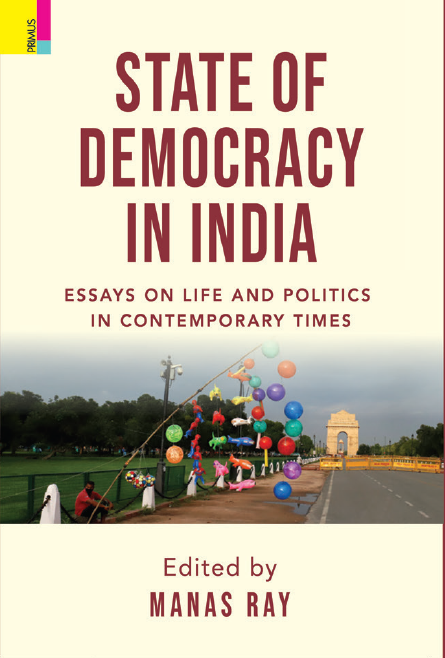
State of Democracy in India: Essays on Life and Politics in Contemporary Times ed. by Manas Ray
EDITOR- Manas Ray
| HB ₹1995. $104.95. ₤79.95 |
||
INFORMATION
- EDITOR : Manas Ray
- HB ISBN : 978-93-91144-99-9
- Year : 2022
- Extent : 694
- Discount available on checkout
- Usually dispatched within 3 to 5 working days.
Collections on Indian democracy are plentiful. Yet rarely do they question the impact of the ongoing democratic mobilizations on the mundane, everyday lives of ordinary citizens and the
world they see around them. Borrowing insights from new research in cultural studies, contemporary literary theory, visual politics, biopolitics, meteorology, to cite a few, State of Democracy in India covers the ground cast aside by existing narratives and analyses of Indian democracy. Pivoted on the experiences of the people and not necessarily the institutions of governance, this collection examines a vast array of markers of democracy under the rubrics of populism, disaster migration, caste contestations, new developments in feminism, and the act of culture. Towards the end of the volume, a meditation on the meaning of writing in COVID-19 induced precarity reflects on the individual and social experiences of living through the pandemic.
The guiding principle of the contributions in this volume is that democracy is not merely a psephological number game of vote sharing and swings but encompasses worldviews, touching every department of life, collective and individual. This innovative collection reconfigures our vision of democracy as a force-field of interests and new imaginations, full of possibilities and
yet fraught with deep fissures and contestations of views and practices.
The Editor
Manas Ray retired as Professor of Cultural Studies at the Centre for Studies in Social Sciences, Calcutta (CSSSC) in 2018. He works at the interface of contemporary political theory and cultural studies. He has published on a wide spectrum of areas including biopolitics, continental philosophy and cinema, critical legal theory, Foucault and governmentality, visual culture, diaspora and Bollywood, disaster migration, and memory and locality in post-partition Kolkata. He has held visiting fellowships and teaching positions in leading institutions of the United Kingdom, Germany, France, The Netherlands, Australia and South Africa. His essay,’Growing Up Refugee’ (History Workshop Journal) is widely regarded as a classic.
‘This is a book of essays, not just about political democracy in India but also regarding India’s democratic culture. They are written under the shadow of its current precarity, reflecting an attractively humane anxiety, even as they are carefully and creatively analytical. The essays are unconventional and engaging throughout and will be of great interest to readers seeking to get past the routines of political punditry to more diverse and unusual perspectives on our times.’
—AKEEL BILGRAMI, Sidney Morgenbesser Professor of Philosophy, Columbia University
‘The volume offers a collection of seminal essays on the different faces of contemporary politics in India. Exploring its manifestations in our times, they track the intersection between broad global processes and the Indian-quotidian. Their thematic sprawl is large and unusual: they address significant aspects of recent cultural, political and material experiences, and they explore problems of gender, forced migration and climate. Together, they articulate possibilities and problems that otherwise function as hidden but important subtexts in our national and everyday lives. The Introduction deftly clarifies their theoretical and political contexts, adding much to the richness of the volume.’
—TANIKA SARKAR, Emeritus Professor, Centre for Historical Studies, Jawaharlal Nehru University
‘Heterogeneous in the wide spectrum of its concerns including populism, migration, caste, gender, and sexual politics, this vibrant study of contemporary India examines the emergent practices and contestations of democracy at ground levels. Lending itself to contrapuntal readings of diverse locations and discourses, the book is surprising at every turn in its embrace of diverse modes of living and thinking. Empirically grounded, these essays have been mapped with care and passion by Manas Ray, who enables us to see how the struggle for democracy in India continues to be seethingly alive in these dark times.’
—RUSTOM BHARUCHA, retired Professor, School of Arts and Aesthetics, Jawaharlal Nehru University
“Every time I touch something,” writes Manas Ray in his beautiful, nuanced text, Trace the Touch: Writing in the Time of Covid-19, “it seems I am exploring…” – Well, so it seems to this writer, every time Manas Ray writes something he is taking the reader along with him on that exploration – as we travel deep into the vaulted arcades of his poetic intelligence, a place of memory and dream, of philosophical understanding and sensitivity of thought.’
—Kirsty Gunn, Novelist and Professor of Writing Practice and Study, University of Dundee, UK




